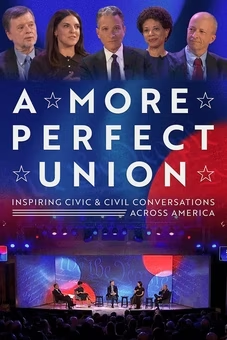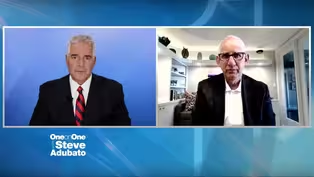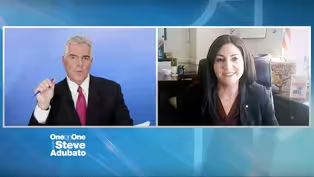One-on-One
CEO of Community FoodBank of NJ addresses food insecurity
Clip: Season 2025 Episode 2813 | 7m 11sVideo has Closed Captions
CEO of Community FoodBank of NJ addresses food insecurity
Steve Adubato and One-on-One Correspondent Mary Gamba sit down with Elizabeth McCarthy, President & CEO of Community FoodBank of New Jersey, to discuss the fight against food insecurity and the relationship between leadership and philanthropy.
Problems playing video? | Closed Captioning Feedback
Problems playing video? | Closed Captioning Feedback
One-on-One is a local public television program presented by NJ PBS
One-on-One
CEO of Community FoodBank of NJ addresses food insecurity
Clip: Season 2025 Episode 2813 | 7m 11sVideo has Closed Captions
Steve Adubato and One-on-One Correspondent Mary Gamba sit down with Elizabeth McCarthy, President & CEO of Community FoodBank of New Jersey, to discuss the fight against food insecurity and the relationship between leadership and philanthropy.
Problems playing video? | Closed Captioning Feedback
How to Watch One-on-One
One-on-One is available to stream on pbs.org and the free PBS App, available on iPhone, Apple TV, Android TV, Android smartphones, Amazon Fire TV, Amazon Fire Tablet, Roku, Samsung Smart TV, and Vizio.
Providing Support for PBS.org
Learn Moreabout PBS online sponsorship(upbeat music) Recently, together with my colleague Mary Gamba on our sister series, "Lessons in Leadership," we sat down with a not-for-profit leader.
She is Elizabeth McCarthy, President and Chief Executive Officer of the Community Food Bank of New Jersey.
What do we talk about?
Not-for-profit leadership, food insecurity, the role of philanthropy in very challenging times.
Let's check out that conversation.
- Elizabeth, great to have you with us.
- Thanks for having me.
- We got the website up right now.
Tell everyone what the food bank is.
- Community Food Bank of New Jersey is the largest food bank in New Jersey.
We serve 15 out of the 21 counties and we work with about 800 partners throughout the state providing food to soup kitchens, to pantries, to child feeding programs as well as increasingly and more importantly, kind of getting to some of the root causes of hunger.
So really trying to work in health systems, trying to make sure that people have the nutritious food that they need, not just, you know, canned food of food banks of yesteryear.
- So everyone go on the website, find out more and be supportive if you can.
In that spirit, Mary and I in our leadership coaching talk about all kinds of leadership tips and tools and people will say, well, a not-for-profit, which the Community Food Bank of New Jersey is, well, you know, it's not the same leadership as in business.
Well, it's not the same-same, but it's pressure-filled and challenging.
Talk about leadership in the not-for-profit world that you live in.
- Yeah, I often tell people that I'm like a non-profit is still a business.
We don't pay some taxes, but we still are a business.
I still have to balance a budget.
The thing that I think is different is many of the people who work at the Community Food Bank have lived experience with food insecurity.
We run a lot of reentry programs, so some people have, you know, sometimes very recent prison history.
It's a population that has been traumatized in some ways.
So I do think the approach is a little different.
I had a great mentor who always, who taught me first about servant leadership and I think that model has always been really important to me and really resonated for me working in social service.
That I am really here to serve, of course, people in New Jersey with food insecurity, but also the staff of CFBNJ.
- Well said.
Mary.
- Elizabeth, where are we right now when it comes to food insecurity?
We talk a lot about leadership, fundraising, bringing in those necessary dollars, also the donations.
What has changed, where are we?
I know, right while COVID was really running rampant and things were, we were in it, a lot of donations I'm sure were coming in, but now that we're a little bit away from it, talk about the latest trends in food insecurity and what more we need to be doing to address that challenge.
- You know, it's a great question 'cause people were so connected to the issue during the pandemic and I think, you know, there's a lot going on in the world.
Other issues have kind of taken the headlines, and unfortunately food insecurity has gotten worse, not better.
You know, the cost of living has gone up.
Wages haven't always kept pace.
We see a lot of working people online to pantries because they kind of just can't make it to the next paycheck.
And our donors are amazing and so we have, you know, we've been able to retain a lot of donors, but it has dropped somewhat since the pandemic, even as the numbers have gone up.
So it's a challenge.
- You know, in many ways, Elizabeth, as the leader of the Community Food Bank of New Jersey and the work you've done before this, you're an advocate, fair to say?
- Absolutely.
- Talk about the connection between leadership and advocacy.
- Yeah, I think it's a very important connection, especially working in social services.
We can do our best to, you know, get food out to people, get programs out to people.
We do some workforce development, but if we're not working with our government partners and letting them know what we're seeing on the frontline, we're really missing the boat.
So making sure that they know which policies matter and which things actually we think can have an impact.
You know, we do a lot of enrolling people in benefits, things like SNAP.
But if there's really long turnaround times or there's blockades in the government, we have to tell them about that so that we can all work together to find a solution.
- And SNAP, formerly known as Food Stamps, correct?
- Yes.
- Last question on my end before Mary jumps back in.
Your passion for this work comes from where?
- My family was always just really social justice-oriented.
Both of my parents, neither of them worked in nonprofits or any of that, but we always, as a family, I'm the youngest of six kids, we were always volunteering out on picket lines during the Cesar Chavez sort of movement.
My parents just kind of had that orientation and I think passed that along to us.
- And by the way, check out Cesar Chavez, the work they did with migrant workers and their working conditions.
Historically significant in the 1960s and changed things dramatically for the good.
Mary, last question.
- Yeah, my last question, Elizabeth, really goes back to leadership and wellness.
I'd have to imagine that the people that work for you, the volunteers getting the buy-in and everyone to, it's really challenging work.
How do you encourage a culture of wellness with the work that you're doing when there are so many challenges that you are facing in that regard?
- It is a great question and it's something very top of mind for us.
You know, the work is hard and it's often, especially coming up on the holidays, it's a very busy time for us.
And so we really actively had some programs for people.
We've done some guided meditation programs for staff, all optional, of course, but created a wellness day.
We had just sort of a time for staff.
Everyone kept saying, we really like our coworkers, we never have time to kind of just be together.
And so we had a day and there were yoga workshops and other things that people could do.
We kind of had one day where we were not delivering food.
So we're always really trying to listen to staff, see what can help, what helps them in their own lives, and keep that wellness as a top priority.
- Mary, you and I talked in another segment about intentionality.
Elizabeth and our team are clearly intentionally focusing more on wellness and wellbeing in these challenging times.
Elizabeth McCarthy, President and CEO of Community Food Bank of New Jersey.
Elizabeth, thank you so much for joining us.
We appreciate it.
- Thank you both.
It was great to see you.
- You got it.
Stay with us, we'll be right back.
- [Narrator] One-On-One with Steve Adubato is a production of the Caucus Educational Corporation.
Funding has been provided by New Jersey Children’s Foundation.
Valley Bank.
Bergen New Bridge Medical Center.
Seton Hall University.
Horizon Blue Cross Blue Shield of New Jersey.
PSEG Foundation.
New Jersey Sharing Network.
Johnson & Johnson.
And by The Adler Aphasia Center.
Promotional support provided by NJ.Com.
And by New Jersey Monthly.
- At the New Jersey Children's Foundation, we believe all children should have access to a high quality public education regardless of where they live.
We believe schools should place students on paths to success, and we invest in schools and educators who are meeting those needs.
Whatever your seat on the bus: student, parent, teacher, business leader, you have a role in our mission.
In Newark, district and charter schools show great education is possible.
We're working to unite people across the city and state to provide students with the schools they deserve.
Advice for young adults pursuing a career in law
Video has Closed Captions
Clip: S2025 Ep2813 | 12m 2s | Advice for young adults pursuing a career in law (12m 2s)
Principal of Park Elementary talks about empowering teachers
Video has Closed Captions
Clip: S2025 Ep2813 | 9m | Principal of Park Elementary talks about empowering teachers (9m)
Providing Support for PBS.org
Learn Moreabout PBS online sponsorship
- News and Public Affairs

Top journalists deliver compelling original analysis of the hour's headlines.

- News and Public Affairs

FRONTLINE is investigative journalism that questions, explains and changes our world.












Support for PBS provided by:
One-on-One is a local public television program presented by NJ PBS

